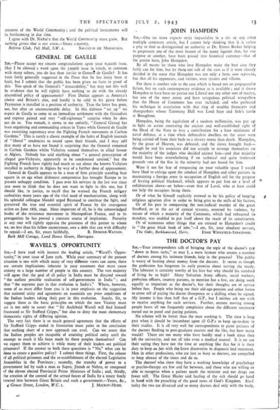JOHN HAMPDEN
SIR,—One no more expects strict impartiality in a tri- or any other multiple centenary article, but I cannot help thinking that it is rather
a pity to find so distinguished an authority as Dr. Ernest Barker helping to perpetuate one of the most brazen of the many legends that, for one purpose or another, have been passed into historical currency—that of the patriot hero, John Hampden.
By all means let those who love Hampden make the best case they fairly can for him, but let them not talk of the case as if it were already decided in the sense that Hampden was not only a hero, sans reproche, but that all his opponents, and victims, were tyrants and villains.
For there is another side to the case which is based not on propagandist fiction, but on such contemporary evidence as is available ; and it shows Hampden to have been no patriot nor Liberal nor any other sort of martyr, but one of the most astute and least scrupulous political wirepullers that the House of Commons has ever included, and who perfected his technique in association with that ring of wealthy financiers and sharepushers whose Tammany Hall was Lord Saye and Sele's tattle at Broughton.
Hampden, being the equivalent of a modern millionaire, was put up to fight an action contesting the ancient and well-established right of the Head of the State to levy a contribution for a bare minimum of naval defence, at a time when defenceless dwellers on the coast were being carried off from their beds to a slavery worse than death. Hampden, by the grace of Heaven, was defeated, and the slaves brought back— though he and his associates did not scruple to revenge themselves on the majority of the judges who decided against him—and that majority would have been overwhelming if on technical and quite irrelevant grounds two of the five in the minority had not found for him.
Were it not for fear of trespassing on your valuable space I would have liked to enlarge upon the conduct of Hampden and other patriots in maintaining a foreign army in occupation of English soil for the purpose of levying political- blackmail, which appears to put him on a level of collaboration above—or below—even that of Laval, who at least could not help the occupiers being there. .
Or of what he himself explicitly avowed to be his policy of keeping religious agitation alive in order to bring grist to the mills of his faction.
Or of his part in compassing the non-judicial murder of the great. Strafford, or in the act of cynical tyranny,. extorted by violence, by means of which a majority of the Commons, which had exhausted its mandate, was enabled to put itself above the reach of its constituents.
Or of numerous other things that are entered to Hampden's credit in " the great black book of jobs."—I am, Sir, your obedient servant,


























 Previous page
Previous page